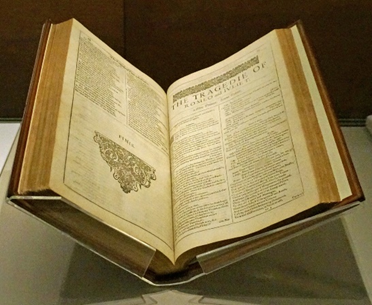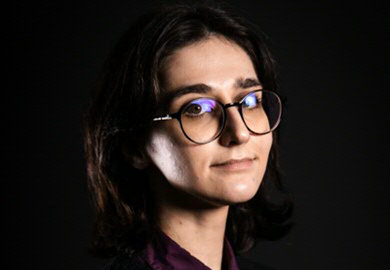
How do literature and culture create identity? What effect does literature and telling stories have on modern society? How can literary studies shape the future?
The academic study of English
literature can be used to reflect on the ways that people interact
with one another, providing a catalyst for insight into
contemporary social debates. While acquiring key skills in
analysis, interpretation, critical thinking, research and
independence, you will have the opportunity to study the rich
literatures and cultures of the British Isles and North America, as
well as other countries where English is used.
Our MA is the only programme in the
Netherlands to feature creative writing modules that allow students
to hone their skills in crafting poetry and short stories.
Throughout the course of the MA, students have the opportunity to
tailor their study to their specific interests, from medieval
classics to the Victorian novel to fan fiction, undertaking modules
taught by lecturers at the top of their fields. This programme
provides a personal approach, prioritizing working in small classes
in close contact with staff.
The programme also features the option
to do an internship, giving our students the opportunity to create
a network and gain hands-on experience working in industry. Our
students often go into writing and publishing, and publishers
recognize our programme as an ideal preparation for entering the
field. This programme develops your writing, presentation and
debating skills for both an academic and professional context,
preparing you for entering an international job market.
For more information see: English Language & Culture.
The MA track in English Literature and Culture offers a programme in line—in terms of content and quality—with leading British and North American universities. Our programme is tailored to your needs, with small classrooms that facilitate plenty of interaction with your lecturers and fellow classmates.
| Semesters | ||||
|---|---|---|---|---|
| CoursesCourse Catalog > | 1a | 1b | 2a | 2b |
Creative Writing 1 (5 EC)
You can find all items and detailed course descriptions on Ocasys (make sure to select the correct year at the top right). | ||||
Research Topics in English Literature 1 (5 EC)
You can find all items and detailed course descriptions on Ocasys (make sure to select the correct year at the top right). | ||||
| Literature in Society (10 EC) | ||||
Creative Writing 2 (5 EC)
You can find all items and detailed course descriptions on Ocasys (make sure to select the correct year at the top right). | ||||
Research Topics in English Literature 2 (5 EC)
You can find all items and detailed course descriptions on Ocasys (make sure to select the correct year at the top right). | ||||
Research Topics in English Literature 3 (5 EC)
You can find all items and detailed course descriptions on Ocasys (make sure to select the correct year at the top right). | ||||
| MA Thesis (20 EC) | ||||
Research Topics in English Literature 4 (5 EC)
You can find all items and detailed course descriptions on Ocasys (make sure to select the correct year at the top right). | ||||
The course titles of the literature tutorials, above, are recent
examples. Courses vary each year. For detailed information about
compulsory and optional courses, please visit Ocasys.
For information about the variety of areas in which students can
write their dissertations, click the Research tab below.
As part of the programme, students can opt to complete a
10-credit work placement (an internship). At the Faculty of Arts,
students are responsible for finding a placement for themselves and
having it approved by the placement coordinator for their
programme.
Students can also follow Masterlanguage courses. These
courses are jointly organised by the English departments of the
universities of the Netherlands and take place all over the
country. More information about them can be found on the
Masterlanguage website
.
| Programme options |
|---|
| Master's Placement (specialization) This Master's track includes an optional work placement for which you are awarded ECTS credit points. It is your responsibility to find a placement yourself, but the Office for Student Affairs can offer help with this where necessary. |
| Specific requirements | More information |
|---|---|
| previous education |
Students with a Bachelor's degree in the field of English Literature and/or Culture are admissible to this Master's track. |
| language test |
Additional English language requirement: a TOEFL iBT with a score of 110 (min. of 25 on all items); an IELTS, Academic Module, with a score of 8 (min. of 7.5 on all items); ERK level C1 or Cambridge C1 Advanced (level A) or C2 Proficiency with a minimum score of 200. If your BA does not certify this, you may have to take an appropriate language test. |
| other admission requirements |
To assess whether your educational/academic background meets the specific programme requirements, we will consider the level and curriculum of your previous studies. This evaluation is carried out by our Admissions Office and the Admissions Board. Students with an international diploma should fill in the checklist. This checklist needs to be uploaded via Progress Portal when applying for this programme. |
| Study programme | Organization | Transition |
|---|---|---|
| English Language and Culture | All Research universities | No additional requirements |
Note: it's only possible to a very limited extent to start in February. For more information, please contact the study advisor.
| Type of student | Deadline | Start course |
|---|---|---|
| Dutch students | 15 August 2026 | 01 September 2026 |
| 15 August 2027 | 01 September 2027 | |
| EU/EEA students | 01 May 2026 | 01 September 2026 |
| 01 May 2027 | 01 September 2027 | |
| non-EU/EEA students | 01 May 2026 | 01 September 2026 |
| 01 May 2027 | 01 September 2027 |
| Specific requirements | More information |
|---|---|
| previous education |
Students with a Bachelor's degree in the field of English Literature and/or Culture are admissible to this Master's track. |
| language test |
Additional English language requirement: a TOEFL iBT with a score of 110 (min. of 25 on all items); an IELTS, Academic Module, with a score of 8 (min. of 7.5 on all items); ERK level C1 or Cambridge C1 Advanced (level A) or C2 Proficiency with a minimum score of 200. If your BA does not certify this, you may have to take an appropriate language test. |
| other admission requirements |
To assess whether your educational/academic background meets the specific programme requirements, we will consider the level and curriculum of your previous studies. This evaluation is carried out by our Admissions Office and the Admissions Board. Students with an international diploma should fill in the checklist. This checklist needs to be uploaded via the Progress Portal when applying for this programme. |
Note: it's only possible to a very limited extent to start in February. For more information, please contact the study advisor.
| Type of student | Deadline | Start course |
|---|---|---|
| Dutch students | 15 August 2026 | 01 September 2026 |
| 15 August 2027 | 01 September 2027 | |
| EU/EEA students | 01 May 2026 | 01 September 2026 |
| 01 May 2027 | 01 September 2027 | |
| non-EU/EEA students | 01 May 2026 | 01 September 2026 |
| 01 May 2027 | 01 September 2027 |
After graduating from the MA English Literature and Culture programme, you will be equipped with academic and professional skills that will prepare you for further study at PhD level and for the job market. You will have developed the ability to:
Your degree in English Literature and Culture is the perfect preparation for your future career. As an MA English graduate, you will not only have obtained a broad and detailed understanding of the language, its history and cultural contexts, but will have acquired specialist skills that are highly sought after by numerous institutions and companies. Our graduates think critically, are self-motivated, disciplined, reflective and have an excellent style of communication.



The MA in English Literature and Culture at the University of Groningen was a fast-paced, vibrant, and, ultimately, life-changing experience. After working for a number of years as a journalist in Canada I wanted to make a change and attempt an academic career; the Master's programme at RUG—with its interactive seminars and tutorials, engaged student body, and amazing academic instruction—was the right place to continue my studies and make the change I was looking for..
